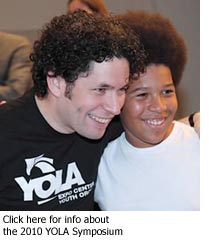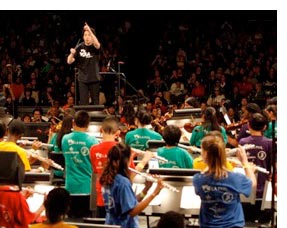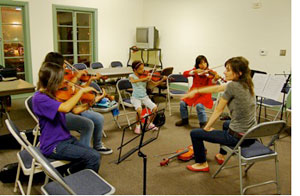Making a joyful noise
November 1, 2009
The fireworks cascading above the Hollywood Bowl have died down. So, for the moment, has the roar of Gustavo-mania that has greeted the arrival of the Los Angeles Philharmonic’s charismatic new conductor, Gustavo Dudamel. But in a small practice room on the second floor of a building next to the 1932 Los Angeles Swim Stadium, something is burning bright.
It’s a weeknight, just before Halloween. Paloma Udovic, 28, is heading into her fourth straight hour of teaching here at the Expo Center near USC, where her organization, the Harmony Project, is part of a unique collaboration with the Los Angeles Philharmonic and the city Department of Recreation and Parks. She’s upbeat and gently welcoming as the viola section files in: Cathy Gomez, Claudia Tinajero, and the Pinto-Quintanilla sisters, Amy, 10, and Arian, 13. The Pinto-Quintanillas are a force to be reckoned with around here—a third sister, 16-year-old Adria, also plays cello in the orchestra.
While the Pinto-Quintanilla family trifecta is notable (“I think that’s the record,” Udovic says), it’s hardly unusual.
There’s an infectious energy that seems to pull everybody—brothers, sisters, parents, grandparents, cousins—into the vortex of Youth Orchestra Los Angeles (YOLA), an ambitious and growing program modeled on Venezuela’s legendary El Sistema, whose most famous alum just happens to be that cool new guy on the podium at the Phil.
YOLA isn’t an orchestra per se. Gretchen Nielsen, the Phil’s director of educational initiatives, describes it as a movement to establish youth orchestras in under-served communities. “When you do something this intensively,” she says, “you’re building a sense of community, a sense of family. These kids don’t have easy lives. A lot of them are taking care of siblings, or come from broken homes…If they’re late for class, you ask what’s going on, but you don’t scold.”
It all started when a Los Angeles Philharmonic delegation visited Venezuela to observe El Sistema in 2007—back when the notion of landing Dudamel as the orchestra’s music director was still under wraps. “That trip kind of opened everyone’s eyes,” Nielsen says.
“What happened in Venezuela had to happen here.”
 The YOLA EXPO Center Youth Orchestra program is the first such venture, but it won’t be the last. With 200 students ranging in age from seven-year-olds to teenagers now playing in two orchestras at Expo, the Phil is planning to add another site next year, on its way to yet another by 2013, serving a total of 1,000 students.
The YOLA EXPO Center Youth Orchestra program is the first such venture, but it won’t be the last. With 200 students ranging in age from seven-year-olds to teenagers now playing in two orchestras at Expo, the Phil is planning to add another site next year, on its way to yet another by 2013, serving a total of 1,000 students.
The Expo Center kids were a focal point of the huge free concert at the Hollywood Bowl that inaugurated the Dudamel Era in Los Angeles.
More than a month later, everybody who was there is still saying the words “October Third” like somebody might say “The Fourth of July”—a holiday, a triumph, a date that will live in ecstasy.
“I thought it was going to be a really big thing. It was even bigger than that, especially when Jack Black came on,” says 13-year-old Arian Pinto-Quintanilla, a student at Palms Middle School in West L.A. “We stayed for the fireworks. Everything was, like, movie-ish.”
As for Dudamel, “he treated us as if we were his actual orchestra.”
Which, in a sense, they now are.
At the rehearsal for the Hollywood Bowl concert, Dudamel, wearing jeans and a black T-shirt inscribed with “YOLA” and “Expo Center Youth Orchestra,” is a natural, encouraging and funny as he leads the students through an arrangement of Beethoven’s Ode To Joy.
He cracks them up. “Violins, I can see you play but it’s so boooooring.” He asks the cellists if they’re a bunch of 85-year-olds. He makes them sing. He precedes a downbeat by counting in Spanish: “Uno, dos, tres, y….”
He’s helping them see their youth as an outrageous power source, something that can help them play—and be—bigger. “What is the size of our instrument?” he asks the cello section. “Is it like this?” he says, indicating tiny. “Or like THIS?”—arms spread wide.
Ode to joy, indeed.
Star-studded concerts at the Hollywood Bowl are one thing. The hard slog of day-in, day-out practicing is another.
Expo Center orchestra students have three nights of group sectional lessons every week and a full orchestra rehearsal on Saturdays. Some, like the Pinto-Quintanilla girls, play in more than one orchestra.
But, amazingly to anyone who ever resisted piano lessons or been pushed into patent leather shoes and paraded into a symphony hall against their will, the YOLA/El Sistema method actually seems…fun.
“It’s very different from the teaching I’ve done where the parents are forcing them,” Udovic says. Here, at the Expo Center, “it’s the other way around.”
For the kids, part of the appeal has to be the pure play of it all. Before the viola sectional that the Pinto-Quintanillas take part in, the violins have their turn.
A little girl in a sparkling white-and-silver costume floats around the room playing “Invisible String Master,” poking backs, correcting wrist positions, delicately but insistently making her compatriots look more like, well, real violinists.
The informal mood continues into the viola sectional.
“Can we make sure our booties are scooted all the way to the front of the seat?” Udovic urges.
Udovic asks whether the scale they just played was in tune. One of the girls admits she wasn’t listening.
“Listen,” Udovic tells the girls, imparting life wisdom as well as musical advice. “It’s not just in music. It’s in lots of other things. It’s a good thing to do.”
“I view this as a social program, with music as the mode,” says Udovic, 28, a Northwestern grad and self-described “Suzuki baby” who picked up her first violin at age 3. She’s part of a cadre of more than a dozen “teaching artists” on the program staff, working musicians with a gift for instructing young people and an interest in social progress.
Mirna Quintanilla, a medical assistant in Beverly Hills, is the mother of Adria, Arian and Amy—her “three A’s,” she says. Those letters aren’t just initials: “That’s what I tell them for the grades. Only A’s.”
After getting divorced, Quintanilla says, “my priority was to keep them busy.” There were art classes and music, lots of it. They haven’t looked back. “We are busy seven days a week,” she says. Even though they log a lot of miles from their home near the Expo Center (the program aims to serve kids living within a 5-mile radius), you won’t hear her complaining.
“I don’t mind,” she says. “My priority now is my three daughters.”

At left, Amy Pinto-Quintanilla, 10, practices the viola. Her sister, 13-year-old Arian Pinto-Quintanilla, right, plays viola, too. Both also play the violin.
The Expo Center program is free, as are the instruments. “To pay for these classes, we could not afford it,” Quintanilla says. And the results: priceless—like having your daughters perform at the Bowl, under the direction of Dudamel. “I invited all my friends,” Quintanilla says. It wasn’t until the next day that the accomplishment actually sunk in for her daughters: “We played in the Hollywood Bowl.”
Beyond the thrill of such moments, the program derives much of its power from its commitment to spreading its mission and methods around the world.
Dudamel’s mentor, El Sistema founder Dr. José Antonio Abreu, won a 2009 TED award and is using the $100,000 prize to endow the Abreu Fellows Program at the New England Conservatory of Music. Abreu fellows will perform internships at El Sistema-inspired “nucleos” across the U.S.; some will be at Expo Center this spring.
Also in the works: a program developed with USC’s Musical Education Department to begin bringing early childhood music classes to the 3- to 5-year-olds in the Expo Center preschool starting in January.
The Colburn School, across from Disney Concert Hall in downtown Los Angeles, also is getting in on the act with the Colburn Mentorship Program, in which 20 conservatory students will be paired with 20 Expo Center students for one-on-one lessons.
Abreu, in town for the Dudamel debut concerts, recently dropped by the Los Angeles County Hall of Administration to pay a visit to County Supervisors Zev Yaroslavsky and Gloria Molina, along with Philharmonic President and CEO Deborah Borda.
They talked about Abreu’s now-famous observation that children who hold hold instruments can’t hold guns, and recalled the advice he gave Borda when they talked about importing El Sistema to L.A. “Think big but start small.”
The advice now: “Grow without fear.”
















 405 bridge work causes a stink
405 bridge work causes a stink